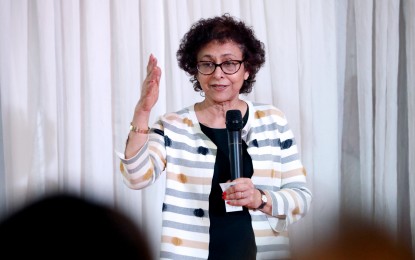
United Nations Special Rapporteur for Freedom of Expression and Opinion Irene Khan (File photo)
MANILA – United Nations Special Rapporteur for Freedom of Opinion and Expression Irene Khan has expressed appreciation for the Philippines’ commitment to human rights.
Khan’s recognition of the Philippine government’s resolve to uphold and protect human rights was expressed during the conduct of a lecture on international human rights law at the Ateneo Law School Auditorium within its Rockwell Campus on Wednesday, the Presidential Task Force on Media Security (PTFoMS) said in a statement on Thursday.
The event, hosted by the PTFoMS in collaboration with the Ateneo Law School through the Teehankee Center for the Rule of Law, was attended by over 100 participants, including students, professors, lawyers, and other members of the academic community.
“The audience were honored by the presence and insights of the United Nations Special Rapporteur (UNSR) Irene Khan, who is evaluating the current state of human rights within the country,” the PTFoMS said.
“Khan took note of the bold nature of the Philippine press and lauded the Philippines' historical commitment to human rights, being one of the drafters of pivotal human rights documents such as the Universal Declaration on Human Rights right after the founding of the United Nations in 1948 where the Philippines is also a founding member,” it added.
The PTFoMS said the lecture delved into the origins and evolution of human rights, “underscoring the intrinsic human struggle for these rights and the importance of challenging authority to improve societal conditions”.
It said the challenges faced by the journalists were also given “special attention,” including the perils of disinformation and the need for media literacy and transparency to empower citizens in discerning credible information sources.
“In a series of engaging Q&A (question and answer) sessions, Khan addressed common human rights issues related to Freedom of Opinion and Expression, the delineation of boundaries in critiquing public officials, the role of the state in protecting citizen rights, and the necessity for independent oversight in ensuring transparency,” the PTFoMs said.
The PTFoMS said Khan, when the red-tagging issue was raised, had emphasized the Marcos administration’s assurance that it is “not an official government policy”.
“Nonetheless, she acknowledged that international law clearly prohibits any speech that incites violence, hatred, or discrimination,” it said.
The PTFoMS said there was also a discussion on international law and the role of individuals “not merely as subjects but as central figures in international human rights”.
It added that the responsibilities of States as “duty bearers to respect, protect, and be accountable to their citizens and to each other” were highlighted, emphasizing mutual accountability and the universal concern for human rights abuses.
The lecture is among the engagements arranged by the PTFoMS for Khan who had expressed her desire to also engage with the members of the academe.
The PTFoMS said the event underscored the critical nature of Freedom of Opinion and Expression as a foundational pillar of democracy and its indispensable role in fostering a “more informed, participatory, and equitable society.”
“The government's commitment to upholding these principles and engaging in constructive dialogue with all stakeholders remains unwavering,” it said. (PNA)
